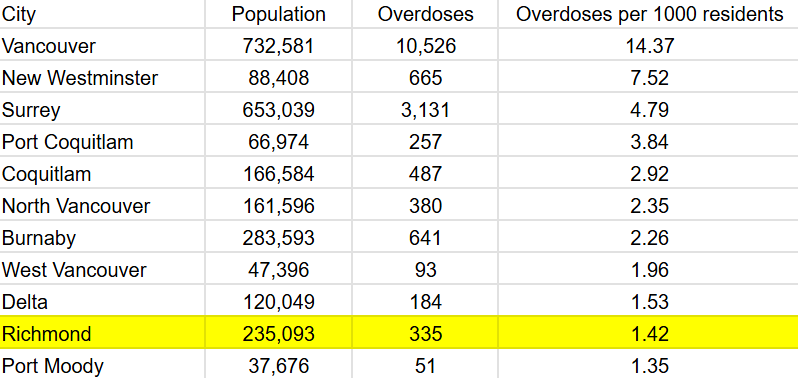How to Follow the Final BC Election Count Without Going Crazy
In the immediate aftermath of an election, you'll hear some unique statements about the outcome:
“[Eby] may remain premier, but not because British Columbians want him there.”
“Because [of] the Opium War… Chinese Canadians are very scared of the negative impact of drugs.”
All of these explanations may have elements of truth. But they all rely much more heavily on truthiness.
Part of this is the way we consume news these days. Everything needs an instant reaction. Everything needs immediate analysis. But the reality is that these things take time to dig down into. If the Conservatives end up with 150 more votes spread across two ridings, they’ll have a majority. Would those extra 150 votes fundamentally change your analysis about the will of the voters?
Well, not if you're Rob Shaw:
“But we already know the bottom line: David Eby lost this election, even if he won.”
Some of the pundits amongst us are blessed with the rare ability to read the will of the voters, regardless of how people actually vote! If only I were so lucky.
But this question is serious. Voting day is just a snapshot in time. We don’t know exactly why each individual person voted. That doesn’t mean that elections are irrelevant. But it does mean that it’s a lot trickier to unleash accurate takes about why people voted the way they did.
So what were the real takeaways from the election?
Land doesn’t vote, but lots of empty land around you can make your vote look way more important. Especially compared to the votes of those pesky city folks.
Despite all the negative press about the NDP’s significant new housing changes, the areas most affected were still dominated by the NDP.
This includes all five Burnaby ridings, where the city just ignored the province’s second deadline to implement upzoning near transit stations.
This was even notable in wealthier ridings that currently lack housing options (like Kitsilano & Oak Bay).
Drug policy didn’t seem to be an issue for the NDP anywhere near the DTES, but it was reportedly significant in Richmond. Interestingly, Richmond had amongst the lowest overdoses per capita of any Metro Vancouver city in 2023.
The age-old trick of promising brand new infrastructure looks like it was successful. But there hasn’t been much (or any?) analysis of the electoral effect of these commitments. Why? There’s nothing ideological about people wanting new infrastructure. The pundit takes-economy thrives on broad and conclusive statements about what people think and believe. It’s not as fun to say that “the Conservatives nearly won the election by effectively targeting spending promises in electorally valuable areas.”
Were voters in the Surrey-Panorama & Surrey-Newton ridings influenced by the uncosted promise to extend the Skytrain to Newton?
What about the, again, uncosted promise to build a new children’s hospital in Surrey? Or the promise1 to expand the Patullo Bridge to six lanes?
In Maple Ridge East, Bob D’Eith and the NDP are currently losing by ~300 votes. How big of a factor was the Conservative’s promise to expand Mission Memorial Hospital with a new maternity ward?
Did voters in the Fraser Valley want privatized healthcare? Or did they just want their nearby hospital to stop closing down once a week?
I’m not saying that Elections are all about new spending promises. But they absolutely do matter! It’s crazy how quickly everyone’s moved on to discussing ideology and crime and drugs and the “moral superiority” of the NDP without first digging into any of these huge spending promises and their potential effects.
Elections are critically important. But understanding them and why people vote the way they do takes patience. You can’t just stand up on a soapbox partway through the counting of votes and make broad, definitive statements on which ideas WON, and which ones LOST. That’s just not the way our democracy is set up. I’m sorry if that makes your punditry a little more difficult.
It’s enough for an election to just happen. It doesn’t have to mean something definitive about the human race. I’m as guilty as anyone of throwing wild takes out there, but the media has a responsibility to be better than random private citizens. Especially compared to an anonymous blogger with a goofy George Carlin profile pic.
Ultimately, when the media gets into these kinds of proclamations, they promote baseless criticisms of whichever ideas lost (according to them), without ever stopping to consider why they, as pundits, have been granted this divine gift to read the will of the people.
All I’m asking for is a little patience. Is that really so crazy?
these last two promises were also uncosted, but I'm trying to be nice




Also, as Justin McElroy points out, the NDP is poised to win a third term for the first time in their history, and went from 48% of the popular vote last time to 45% now. I'll add this is after two terms in power, dramatic action on housing, a pandemic and it's aftershocks, and a global right wing resurgence. The biggest change, by far, was the implosion of the BC Liberals which eliminated right wing vote splitting.
I saw exit poll interviews of people from Kelowna saying they voted conservative to get rid of Trudeau and the liberals. If people don't even know who they're voting for, it seems unlikely they're voting on the issues.